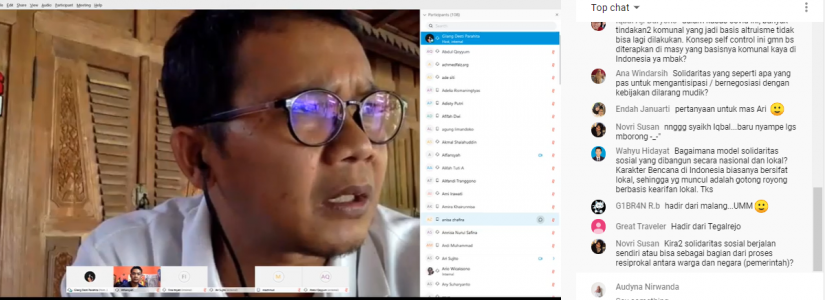
Yogyakarta, April 13th 2020—In the fourth session of the Gadjah Mada University’s Faculty of Social and Political Science discussion series about the covid-19 management, the topic was about “The Rise of Social Solidarity in the Midst of Covid-19”. The speakers were Dr. Arie Sudjito and Mrs. Fina Itriyati M.A. As usual, this discussion series can be accessed by everyone, even those outside Gadjah Mada University. The enthusiasm was apparent through how interactive and full of questions the discussion was, even if it was held online.
Covid-19 pandemic is a hot issue to be debated at this moment of time because of the multiple change and direct or indirect effect it brings to the society’s life. Those changes can be both positive and negative. The changes will be seen as negative if it is seen through the perspective of the economic and social losses that the society is going through right now. But, indirectly, this pandemic also creates a positive change from the bottom that is shown through the society’s solidarity in helping one another.
The social solidarity movement initiated by several individuals, NGOs, neighborhood based community, peace organization, online Whatsapp group, et cetera according to Fina Itrayati is positive. It shows the interdependence, mutual help, altruism, and awareness of the aspect of humanity even amidst this crisis. The existence of solidarity movement shows a clear statement about the response and attitude of the society in helping each other. On the other hand, it shows the uncertainty of the government’s capability to help relieve the impacts of the pandemic that is felt by the society. “This uncertainty is what creates a bottom up power which is shown through initiatives and the society’s need to create a social solidarity amidst the Covid-19 crisis,” said Itrayati.
The rise of social solidarity movements can also be explained by the value that have been the bedrock of our society, that is human as a social animal. The culture of “gotong royong” that is closely related to the majority of our society also helps create the rise of social solidarity movement that aims to help each other. The form of help varies. There’s some that choose to do a fundraising to help those struggling with the economic meltdown and also those that fundraise to buy necessary medical equipment such as masks, hand sanitizer, and PPE. Not only that, in this discussion series, Fina Itrayati also said that there is another form of unique solidarity called “self control”
Self control is a simple measure that we can do as an individual. It is widely known as social distancing. This narration that is build on the value of self control is considered a social solidarity act because it can cut the chains of the corona virus spread in our society. Self control is a form of social solidarity that affects the collective well being. It surely is a simple action. However, if done continuously by the society, it will bring a lot of positive effect to the management of this pandemic. The bottom up initiatives that don’t directly include the government shows that the society can create their own local-based solidarity movement.
The rise of social solidarity in the midst of the Covid-19 pandemic can be a reflective moment not only for the actors of the social solidarity movement, but also for the government that acts as the responsible actor in terms of handling the pandemic and its aftermath. “The social solidarity movement can be identified as a short term initiative by the society with the lack of local government’s presence. These powers can be interpreted as a strategic way for the society to strengthen the government’s agenda that needs to be reevaluated”, Surdjito said. The strengthening of the government’s role is seen as important in order to better respond the demands of the society in the middle of this pandemic.
What needs to be highlighted, as what Arie Surdjito said, is that there is still a lot of future agendas that needs to be paid attention to. Be it about local initiatives that government needs to learn and adopt, the importance of strengthening the civil society, and the need to show positive stories about the social solidarity movements that can be a source of inspiration for everyone.
